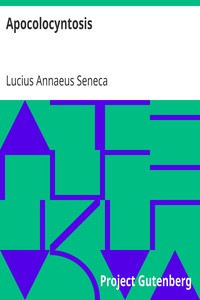Apocolocyntosis by Lucius Annaeus Seneca
"Apocolocyntosis" by Lucius Annaeus Seneca is a satirical work written during the early Roman Empire. Defined as a satura menippea, the text employs a blend of prose and verse to humorously critique the emperor Claudius, particularly through the lens of his posthumous "Pumpkinification," which contrasts sharply with the traditional idea of apotheosis wherein notable figures are elevated to godhood. The narrative primarily explores themes of power, folly, and the absurdities of Roman
politics. The story begins with the death of Emperor Claudius and transports readers to an absurd celestial setting where gods and mythological figures convene to discuss his fate. Despite brief moments of hope from Claudius about his potential divinity, he is quickly met with derision from the gods, including notable characters like Mercury and Hercules. His claims of greatness are undermined as they recount his abysmal rule, highlighting his incompetence. Ultimately, Claudius is subjected to a mocking trial in the afterlife, where he faces the consequences of his actions through unjust punishment, ending with him perpetually shaking dice in a bottomless box—a metaphor for his futile grasp on power. Through this comedic lens, Seneca critiques the nature of rule and legacy, contrasting divine aspirations against a backdrop of human folly. (This is an automatically generated summary.)
Read or download for free
| How to read | Url | Size | |||
|---|---|---|---|---|---|
| Read now! | https://www.gutenberg.org/ebooks/10001.html.images | 58 kB | |||
| EPUB3 (E-readers incl. Send-to-Kindle) | https://www.gutenberg.org/ebooks/10001.epub3.images | 91 kB | |||
| EPUB (older E-readers) | https://www.gutenberg.org/ebooks/10001.epub.images | 89 kB | |||
| Kindle | https://www.gutenberg.org/ebooks/10001.kf8.images | 194 kB | |||
| older Kindles | https://www.gutenberg.org/ebooks/10001.kindle.images | 188 kB | |||
| Plain Text UTF-8 | https://www.gutenberg.org/ebooks/10001.txt.utf-8 | 50 kB | |||
| Download HTML (zip) | https://www.gutenberg.org/cache/epub/10001/pg10001-h.zip | 89 kB | |||
| There may be more files related to this item. | |||||
Similar Books
About this eBook
| Author | Seneca, Lucius Annaeus, 5? BCE-65 |
|---|---|
| Translator | Rouse, W. H. D. (William Henry Denham), 1863-1950 |
| Title | Apocolocyntosis |
| Note | Reading ease score: 76.2 (7th grade). Fairly easy to read. |
| Note | Wikipedia page about this book: https://en.wikipedia.org/wiki/Apocolocyntosis |
| Credits | Produced by Ted Garvin, Ben Courtney and PG Distributed Proofreaders |
| Language | English |
| LoC Class | PA: Language and Literatures: Classical Languages and Literature |
| Subject | Claudius, Emperor of Rome, 10 B.C.-54 A.D. -- Humor |
| Category | Text |
| EBook-No. | 10001 |
| Release Date | Nov 1, 2003 |
| Most Recently Updated | Nov 7, 2024 |
| Copyright Status | Public domain in the USA. |
| Downloads | 792 downloads in the last 30 days. |
| Project Gutenberg eBooks are always free! | |

